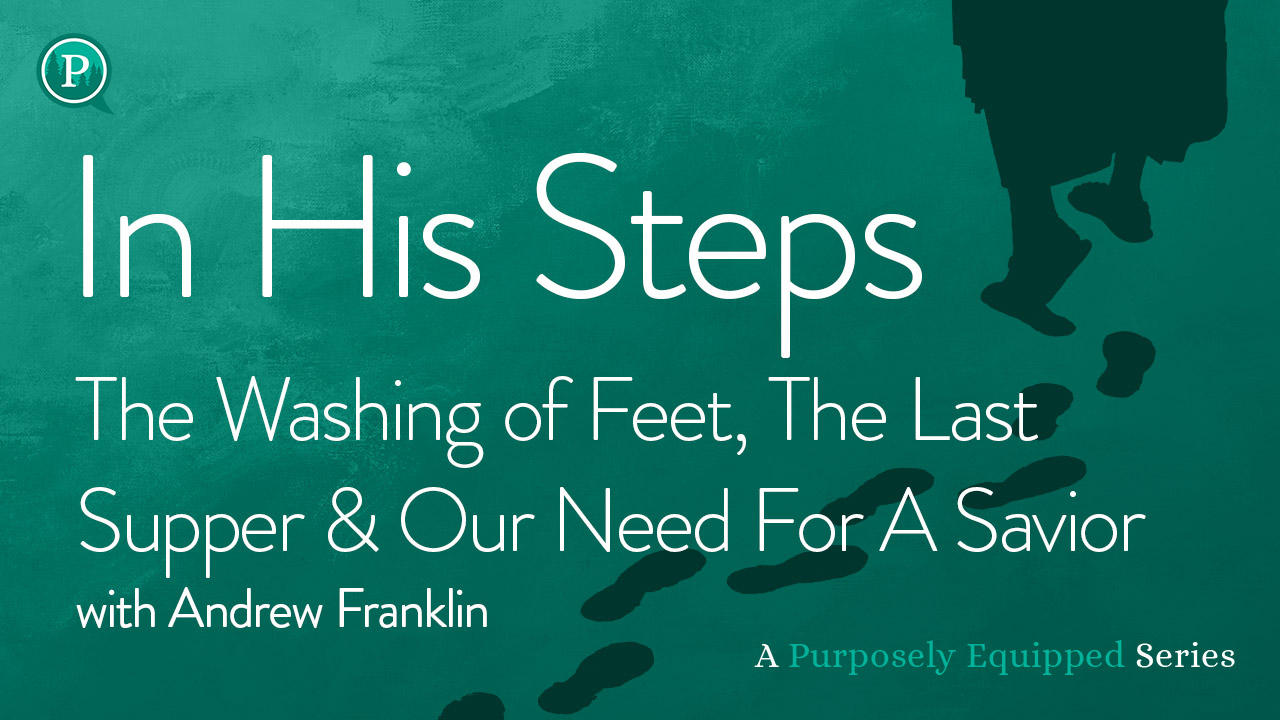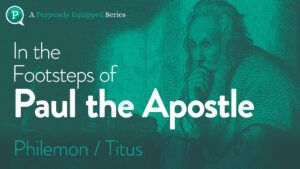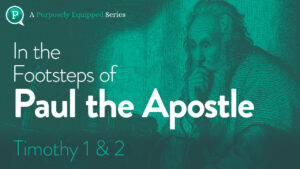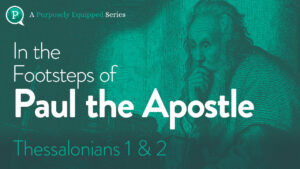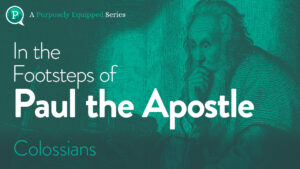This day is packed with meaning as we look at scripture and what was happening on this day. The Last Supper is an important meal Jesus shares with his disciples. As this meal begins, we’ll see the ceremonial washing of feet and understand our true need for a savior. Andrew Franklin from Mosaic Eastside helps look at the scriptures to guide us through the incredible meaning of these important moments.
Show Notes:
Transcription:
Purposely your life, God’s purpose. Listen at onpurposely.com. In His Steps, a Holy Week journey.
Mark Holland:
And once again In His Steps we go day number five of this series looking at the what’s called Holy Week in the Christian faith and learning lots. And today we’re going to learn about day five, what’s important about this day. First of all, we’re going to get to know another pastor. We have Andrew Franklin with us from Mosaic Church. You call it Mosaic East Side or Mosaic?
Andrew Franklin:
Mosaic East Side. Yeah.
Mark Holland:
Mosaic. East Side Church, Mosaic, East Side. Hey Andrew, good to have you with us once again.
Andrew Franklin:
Good to have you Mark. Thanks for having me.
Mark Holland:
Sure, sure. Appreciating all these pastors coming in and participating. We had no problem getting pastors to volunteer to be a part of this, so
Andrew Franklin:
Praise God.
Mark Holland:
So you got to note what that came to you and said, Hey, you want to take one of these days and you were right, right there, or
Andrew Franklin:
Yeah, absolutely. It’s such a special week when the world’s kind of looking at the story of Jesus in a unique way. So it’s like, man, whatever can glorify Jesus, whatever can drop people to him and to the church. I’m all for,
Mark Holland:
Well, this is the time of year, maybe only close as Christmas that people are intrigued about the Christian faith even more than Christmas. We think Easter is more central, even to the Christian faith. It’s kind of what it’s all about.
Andrew Franklin:
Sure, yeah. This is so unique to Christianity, this thought of God giving himself even unto death, defeating death on our behalf, making a way for us to know him. Such powerful stuff. You know, look at anyone’s life is kind of like this, right? But you go through years of life and then it seems like you hit a week or you hit a little spot where it’s like everything happens. And this is one of those times in the life of Jesus where there’s obviously a lot that happened throughout his ministry, but in this week it’s just so packed the meaning of what’s happening for Jesus here.
Mark Holland:
Well, people are intrigued by this and maybe come out to church. They come out at Christmas and Easter. So tell us before we get into this day, number five a little bit more, tell us a little bit about yourself and Mosaic East Side. What you said this is kind of a newer church or it’s an offshoot of another church.
Andrew Franklin:
Yeah, we’re just about a year and a half old. Yeah. I came to know Jesus in 2006. I just had a radical encounter with the love of Jesus and it turned my life around and I began to step into the church and experience the transformation, the restoration that Jesus gives. And so I eventually entered into this church, mosaic Community Church in Seattle. They’ve been around for 15 years or so. They’re at 77th and Aurora. And they began to have people come in from the east side. And so just a year and a half ago they commissioned us, laid hands on us and said, let’s see, church.
Mark Holland:
So you were sent out so to speak?
Andrew Franklin:
Yeah, we were sent out from this church in Seattle and we’re now in Bellevue right off 405 and I 90 and we’re this beautiful, multiethnic, multi-generational expression of the worship of Jesus and believing for his kingdom to come. We just want to live with the simplicity of passionate love for Jesus and being set on the path of his purposes on the earth, doing what he’s wanting to do in the earth, both in Bellevue and to the nations of the earth.
Mark Holland:
Well that’s a great vision. Again, Mosaic East Side. We’ll have more about the church at the end of our talk today. So getting back to the talk day number five and what’s called Holy Week, a lot of things happen on this day. There’s something about washing feet, of course the Last Supper, which I think is pretty central. Again, communion came from the Last Supper, the denial of Peter, Jesus agony. So focus in on some things that we can take away from this day.
Andrew Franklin:
Yeah, there’s so much. This is again true of all of Holy Week and I would say even maybe most particularly this day is just packed with prophetic meaning. So much of what has been written in scripture that we are looking forward to in Messiah is happening on this day. I think first and foremost, this last supper deal, which is where the foot washing happens. Jesus has just been in the temple and there’s so much that has come in the Old Testament that sets the stage for this. So for so many generations and years since Israel’s been brought out of Egypt, they’ve been living out the remembrance of their deliverance through the Passover season and time. And what would happen in the Passover time is lambs would go into the temple to be inspected by the priest for the four or five days leading up to Passover to see if there were flaws in them and they would be set apart if they were flawless.
So Jesus has been in the temple for these days. At the end of it, they’re questioning him, they’re looking for flaws in his theology, they they’re looking for flaws in his teaching. At the end of it, they come back and say, we can find no fault in him. They have no answer, no rebuttal for the teachings of Jesus. So he’s found to be perfect and spotless in his teaching here and now He’s going to go share this meal. So this, think about it like Christmas dinner with your family. This is the most kind of weighty meal of the year, the time that’s the most special time. And he shared.
Mark Holland:
It had already been in a prophetic way every year. Jews were used to this.
Andrew Franklin:
Yes, they would go in and celebrate this Passover saving and
Mark Holland:
Passover again, what is Passover?
Andrew Franklin:
Passover is the remembrance of God’s deliverance of his people through delivering them from slavery to Egypt, making them a free people. So now Jesus is sharing this very important meal with his disciples. And one thing about the Passover Seder, I mean Jewish people still celebrate this today and Messianic Jews, every moment in the meal is a liturgy and it all has spiritual significance. And so one of the ways that the meal begins is through a ceremonial washing of hands. And here’s the moment, and we’ll see this throughout the Last Supper where Jesus takes this liturgy or this process that is packed with spiritual meaning and he reveals an entirely layer of meaning that hadn’t been brought to it before. So we see when they’re at this point of the ceremonial washing of hands, Jesus takes us a step further. He removes his outer garment and bends low and begins washing the disciples’ feet. In other words saying, this isn’t about your body just being cleansed. There’s a way that Jesus wants to personally and intimately interact with his disciples, meet, meeting them and their dirtiest and most needed places,.
Mark Holland:
And they didn’t want this to happen. They say, what are you doing, Lord?
Andrew Franklin:
Yeah, Peter, most specifically, which this is a day where Peter kind of gets a specific highlight on him, and I think it we’re supposed to identify ourselves with Peter, where Peter doesn’t want to, he doesn’t want God to be inconvenienced with his needs and he has to be reminded, Hey, you have more needs than you realize. And so Peter has to learn to let Jesus in this way. Then later on in the meal, Jesus, when they’re dipping the bread into the bitter herbs, which again is written into this Passover Seder service as a sign of the bitterness of slavery, Jesus uses that moment to reveal the bitterness of slavery to sin and the sin that’s living inside Judas most specifically. And when that comes out, then Peter’s the one saying, oh, I would never deny you. I would never betray you. So Peter kind of represents us in that thought of we all want to think we would die for God or die for things that are true, die for Jesus.
And Jesus has to remind him, you’re not as strong as you think you are. And so then they’re going to go into the garden. And Peter, along with James and John, have this visceral example of the desire to go with Jesus and pray with him in his hour of greatest anguish. And yet his weakness in doing so, Jesus has to again remind him and show him himself a little bit really to reveal in all of this Peter’s great need for a savior, even as maybe the most prominent disciple, the one that the readers of this would identify as the leader of the church at this point.
Mark Holland:
Yeah, now Peter was just saying, I’ll never deny you. And he said, he gave that prophetic word that before the night’s over, you’re going to deny me three times.
Andrew Franklin:
And so I think there’s a profound piece here that the Lord is teaching us as his disciples, as his followers, that if even Peter who’s the identified leader has this degree of weakness, we need to be using these moments and times to remind ourselves of how deeply in an ongoing way we need Jesus to be washing us. We need Jesus to be growing us in prayer and strengthening us.
Mark Holland:
Tell us more about the Last Supper. This is the time that instituted what has come one of the main sacraments of the church through the centuries, what we now call communion, but it was instituted at this last Supper. Tell us a little bit more of the importance of the last Supper and communion also that came from this.
Andrew Franklin:
Yeah, it’s pretty amazing. Again, the last Supper really is this Passover meal that we know exactly what they did because Jewish people have been doing it for all these millennia now, and people enter into it today. And so there’s four cups that are drunk during Passover, and the third of those cups is this cup of redemption. And so what we know is interesting is that every time that the unleavened bread is eaten during the Passover, it means something different. Every time that a cup of wine is drunk, it means something different. And so this cup of redemption specifically is a time where the Jewish people have put these three loaves of unleavened bread in an envelope. And there’s one that represents Abraham, kind of the father of faith, one that represents Isaac, who’s the son, and one that represents Jacob in the tribes of Israel, which are representative of all the nations of the Earth knowing God.
So they’re all wrapped up in one package together. So three and one are here, and the middle one is then hidden and it’s removed in the middle of the meal. And this is called the afikomen. And this represents, again, Isaac or the son figure. And this is done all through Jewish homes. Even today it’s removed. And what happens when this afikomen is found, it gets kind of hidden. And then when it’s found it, it’s this moment where there’s this realization that it has this bread or has this been lost? No, it, it’s been found in a new way. So this gets brought out as a sign of Abraham thinking he was going to lose Isaac and then receiving him back. And this is the moment that the afikomen gets brought out, and it’s eaten with a cup of redemption in this place of where someone, in the case of the Passover narrative, it’s about Abraham and Isaac, where Isaac’s supposed to die but is redeemed.
Mark Holland:
God provides a lamb instead,
Andrew Franklin:
God has self-provide. The Lamb and in this moment in the Passover meal is when Jesus takes this afikomen, this piece of bread and it’s, and what it’s put under a stone, that’s where you find it. After this, you put it under a stone so the stone gets lifted or rolled away to reveal this piece of bread. And this is the moment that Jesus says, this is my body. In other words, he’s saying, my body, you’re going to roll away a stone and find my life for yours here, do this in remembrance of me. So he’s giving them a very clear and powerful picture of what’s about to transpire. And he says, this is my body. And then this cup of redemption, he says, this is the new covenant in my blood. You are no longer slaves. He makes a way not just for the physical freedom from slavery, from Egypt, which is what they’ve been celebrating, but making a way for this holistic you are no longer slaves to sin. I have redeemed you with my life. Take this, take my blood over as the Passover lamb covering over your sin. Do this in remembrance of me.
Mark Holland:
Was this the point also where they had these conversations? Unless you drink my blood and eat my flesh, you have no part in me. Was or was that an earlier?
Andrew Franklin:
That’s earlier. But that’s certainly.
Mark Holland:
When it came up again, this stuff about the blood and the body, and we’re not sure if we’re in for this.
Andrew Franklin:
Absolutely. Absolutely. So that’s John six that he really goes into this. And I totally think that John wrote about that in John six as an earlier teaching of Jesus, because the meaning of it came to light here at the Last Supper when he institutes the Lord’s Supper,
Mark Holland:
The institution of communion. Obviously different churches have made more of this than others, and that’s kind of a personal choice, I think. But communion is so important to remember the Lord’s sacrifice for us all these years later is what communion really is about.
Andrew Franklin:
And I do think when we see that original context, we can see, we can get in arguments that are sad sometimes. Is this literally the body and blood of Jesus? Is this just a symbol? And I think the answer to that is really this thought of it’s a sign and this Passover meal. These are a sign.
Mark Holland:
Yeah, I think I’ve been part of a Passover Seder before, but yeah, you’re right. It was so prophetic about what Jesus was going to do and fulfill these Old Testament customs that he was going to fulfill once and for all for his people.
Andrew Franklin:
And so this is paired with it. It’s so profound again, at this Last S upper that he takes this theme of redemption, says, I’m going to fulfill this. But then here’s also where he gives his most extended teaching. I’ve heard one of my mentors called the Last Supper, Jesus’ deathbed talk. This is his last time with his disciples. And he uses all of it to talk about being united with one another, their love for one another. This is the foot washing place of, as I’ve loved you in this way, humble yourself, unite yourself with one another and actually show love. Don’t talk about it in theory, don’t talk about it with religious steps. Do it. Act in love toward one another. And this is how the world is going to know. And of course, he says all this in the next thing that happens in his life is that he has to show love in such a costly, painful way.
Mark Holland:
People think that people just kind of took over, took Jesus on, took him over, and he had no, but he willingly gave up his life for this. And that really comes out the next part of this scene we talk about to in the garden and his agony in the garden. Yes. Tell us a little about it. Jesus is expressing some real, I don’t know if you’d say doubts, but the human side of Jesus Yes. Is really coming out and he’s saying, I know I’m, I’m going to face some terrible things coming up here. Lord help me with this.
Andrew Franklin:
Yes, we see the humanity of Jesus probably most clearly in this moment of his life. And I think it’s really intentionally, and you see this most in the Book of Mark and the way it talks about this moment, but there is this contrast of, again, we see Peter in some of his flaws, his pride, his thinking, I don’t really need you to wash my feet or I don’t want that. I wouldn’t deny you. And we see that contrasted with the humility of Jesus, not only bending low to wash the disciples fee, but also his humility to know I am in human body right now. I don’t want to go through the agony of the cross. I don’t want my body to be in torture. So rather than masking over his need, he gives the Father his need. He gives the Father his agony and his torture there.
So whereas we see Peter’s pride in extension, we see our pride often just exposed in life. We see the humility of Jesus and Jesus show us the way forward to just bring God our weakness rather than trying to mask over it. We see Peter’s prayerlessness right and the other disciples where they fall asleep. Jesus endures, even though he’s sweating blood, he’s not going to stop until he’s heard the will of God and has received the grace to move forward in it. Later we’re going to see Peter’s fear, get the best of him. And he denies knowing Jesus. But Jesus,
Mark Holland:
They all do.
Andrew Franklin:
They flee. They all do. And again, Peter most specifically, we see him deny that he knows Jesus. But Jesus, because of his humility, because of his prayerfulness and because he’s perfect, but he, he’s able in the moment when they ask him, are you the son of God? He can say unequivocally knowing that it’s going to bring him to death. Absolutely. That’s who I am. You just said it and it’s true. And God’s going to testify to this. So yeah,
Mark Holland:
I think this also people can identify with betrayal because Jesus was so terribly betrayed by, well all of them, but specifically obviously by Judas who pointed him out and betrayed and they betrayed him with a kiss. So terrible.
Andrew Franklin:
Yeah. So again, there’s so many layers here, and one of the pieces of the Passover service would be that any leaven in the house, this is the feast of unleavened bread is happening. So leaven would get swept up and thrown out of the house. And again, in this meal is when Jesus sees the leaven or the sin that’s in Judas and says, get away, just go what you do, do quickly get out. So he sends that one who’s been harboring sin away, and then he has to endure having a sign of affection, be the thing that’s going to give him away for torture. And man, again, I think at a heart level, we can all identify with that in some way of just the pain of someone who says that they’ve loved us, that then does something to backstab or to cause us pain. And how is Jesus going to back away and save himself? Or is he going to endure even when love is so painful to him? And what a beautiful picture we get that Jesus recognizes He doesn’t like mask over Judas betrayal. He feels it and expresses it to the death, and yet he endured to the very end out of love, even when it cost him so much.
Mark Holland:
And you’ve been listening to the Purposely equipped series called In His Steps, A Holy Week Journey today featuring Pastor Andrew Franklin from Mosaic Eastside in Bellevue. To find out more about the church, visit them [email protected]. Please leave us a review of this message so more people can discover this podcast and find more episodes of Purposely equipped at onpurposely.com.
Follow this podcast:

